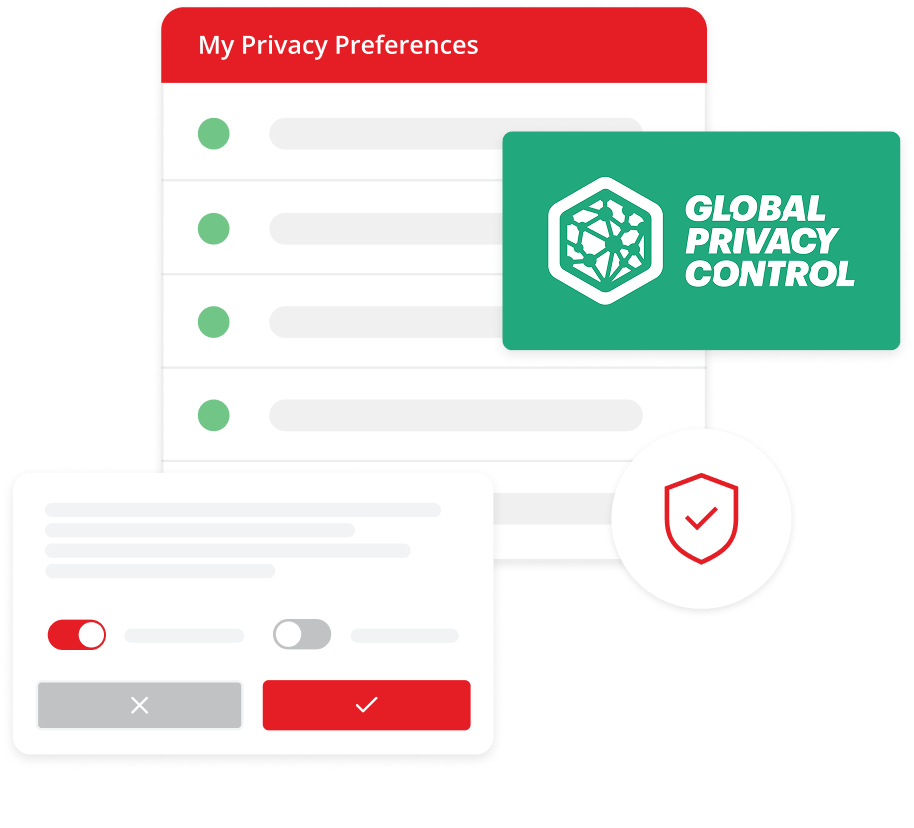Answer the complexities of managing privacy and consent preferences across data privacy regulations, online platforms and geographies by adopting the GPC, a universal technical standard for collecting, managing and transmitting user privacy and consent data, allowing users to communicate their privacy choices easily across various websites and online services.
Trusted and used by 30.000+ websites and companies worldwide.
Setting up Global Privacy Control (GPC) in CookieHub is simple and requires no additional configuration. Once enabled, CookieHub automatically detects and processes GPC signals from users’ browsers or extensions.
Your website will instantly respect “Do Not Sell or Share” requests, ensuring compliance with privacy regulations like the CPRA and CPA. With CookieHub handling GPC responses for you, maintaining transparency and user trust has never been easier.
GPC is a technical standard that allows users to configure their browser or extensions to automatically send a “Do Not Sell or Share” signal to websites.
Several US state privacy laws, including the California Privacy Rights Act (CPRA) and Colorado Privacy Act (CPA), require businesses to honor valid browser-based opt-out signals. GPC is considered one of these valid signals.
CookieHub automatically detects and responds to GPC requests, helping you comply with these legal obligations.
Use our free compliance scanner to detect all active services on your website. Receive a detailed report outlining their types, purposes, and durations to support your privacy compliance efforts.

GPC is a browser feature that allows users to signal their privacy preferences to websites, including the choice to opt-out of data processing for advertising and analytics purposes across global jurisdictions.
One of GPC’s primary functions is to be able to inform websites not to sell or share user data, which takes it a step beyond other privacy tools that focus on limiting tracking but may still allow third-party data sharing.
GPC aims to balance the scales between user privacy and data use in the digital space. Websites that integrate GPC can:
Align with user preferences
Respect and uphold the fundamental right to privacy
Enhance privacy controls
Shift toward a more user-centric approach in the management of personal data
Unify around a single standard
Allow users to communicate their privacy choices easily across various websites and online services
Global Privacy Control (GPC) is a browser-based signal that communicates a user’s request to opt out of the sale or sharing of personal information. Several US state privacy laws, including the California Privacy Rights Act (CPRA) and Colorado Privacy Act (CPA), require businesses to honor valid browser-based opt-out signals. GPC is considered one of these valid signals.
CookieHub automatically detects and responds to GPC requests, helping you comply with these legal obligations, benefiting from:
Recognizing GPC signals automatically:
Many CMPs offer support for GPC, making this straightforward.
Automating opt-out signaling:
CookieHub automatically detects the GPC signal and treats it as an opt-out from selling or sharing personal information.
Ongoing compliance updates:
Stay current with evolving data privacy frameworks
CookieHub detects GPC signals and acts on them automatically, working silently in the background.
If configured in the preference center, specific cookie categories can be auto-disabled.
Ensure that users’ privacy and consent preferences are respected and communicated consistently.
Enable GPC support with CookieHub to automatically honor browser privacy signals and comply with global data protection laws. Build user trust and maintain transparency while keeping your consent management simple and consistent across all regions.
The Global Privacy Control (GPC) is a technical standard that enables users to automatically communicate their privacy preferences, such as opting out of data sale or sharing, to websites and online services. It ensures that publishers, advertisers, and technology partners can collect, manage, and honor user privacy signals in a consistent and interoperable format across global privacy frameworks like GDPR, CCPA, and others.
With privacy regulations expanding worldwide, GPC was developed by a coalition of privacy advocates, publishers, and technologists to replace fragmented, region-specific opt-out mechanisms. It provides a unified way to represent privacy choices, reducing complexity for publishers and vendors operating across multiple jurisdictions.
The GPC signal communicates when a user chooses to opt out of data sales or sharing, ensuring that websites and vendors honor that choice automatically.
It informs websites about:
When GPC is enabled for a region, CookieHub:
Each GPC signal includes:
While not legally mandatory, GPC signals are increasingly recognized and required by major privacy regulations and technology platforms. For example, California’s CCPA and CPRA require businesses to respect global opt-out signals such as GPC, and other jurisdictions are adopting similar standards for automatic privacy preference recognition.
Use the Global Privacy Control if:
GPC helps maintain compliance while supporting efficient data-driven advertising:
Under Regional settings:
The GPC interface will appear automatically for users in supported regions, and privacy signals will be generated and shared with vendors accordingly.
The Global Privacy Control framework aligns with and supports compliance across major global privacy laws, including:
Using Global Privacy Control with CookieHub supports GDPR and CCPA compliance and helps align consent practices globally.
The framework standardizes how opt-out and privacy signals are formatted and transmitted, but full GDPR compliance still requires:
©2018-2026 CookieHub ehf.
CookieHub CMP offers tools and services for managing cookies and online privacy.


